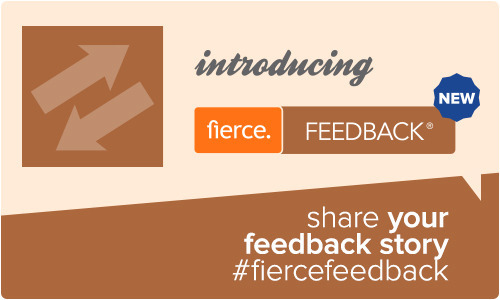Susan Scott's Blog, page 85
May 23, 2014
Fierce Resources: How to Set Goals For The Life You Actually Want
This week’s Fierce Resource was first published on FastCompany.com and was written by Stever Robbins.
How to Set Goals for the Life You Actually Want explores the idea of setting goals based on the journey you want to take to get there. Rather than determining where you want to be in 50 years and then figuring out how you will get there, determine what makes you happy and create your journey. What big, hairy audacious journey have you always wanted to take? What is something you’ve wanted to learn? What action will you take to start your journey today?
“We adopt goals for one reason and one reason only: to change our lives. Rather than adopting a goal you hope will change your life once you reach it, do it the other way around. Choose the journey that for you would be awesome–the activities, personal growth, and friends. Then choose a goal that acts as a compass to give you that life as part of the journey.”
To read the full article, click here.
May 21, 2014
Where Are You Looking for Change in Your Life?
I almost removed the slide that said No Goals = No Change. That’s all it said. It seemed so obvious to me that I felt it hardly needed to be said. I was teaching a class for new supervisors and managers, and it was part of the curriculum. I was focused on getting to the “meatier” stuff.
And then, I started thinking about times in my career that I had found myself stuck or started feeling bored with the day in and day out aspects of my work. I always got myself “unstuck” by focusing on positive goals for my future. I took on new projects to make the work I did more interesting. I tackled some old issues that had gone unresolved. I talked with my boss about future opportunities for growth. I set goals. Because if I didn’t, I was certain to stay stuck.
No Goals = No Change.
Where are you looking for change in your life? This is the question to ask. What are you not happy with? What do you wish were better? Once you identify these things, set a goal or goals to take care of it. Chances are good, one of the things you may need to do is have a conversation with someone.
Set a goal to take care of that…today. Who do you need to talk with in order to make these goals come true? Your boss? Your kids? Yourself?
Set a goal today, and begin. The change will do you good.
This article was originally posted on September 18th, 2012 by Aimee Windmiller-Wood, SVP of Learning & Development.
May 19, 2014
Fierce Tip of the Week: Identify Your Undiscussables
One who gains strength by overcoming obstacles possesses the only strength which can overcome adversity. – Albert Schweitzer
Think of the biggest “things” you need to accomplish in the next month. It is inevitable that you can foresee things that may get in your way of accomplishing them. It may be lack of time, resources, partners, or even motivation to do what is on your plate.
The questions are: What conversations do you need to have? What needs to be addressed to hit your marks?
This week’s tip is to identify your undiscussables and take action. Undiscussables are the topics that you and others have been avoiding at home or at work. These are the topics that will get in your way of moving forward. To get started, write down the name of each person and a sentence or two about the topic for the conversation.
Now, it is in your court to start the conversations.
May 16, 2014
Fierce Resources: Achieving Business Objectives via Team Building
This week’s Fierce Resource comes from TrainingIndustry.com and was written by Ash Curtis.
Achieving Business Objectives via Team Building explains the importance of creating a happy, productive team through communication, collaboration, and creativity that can drive business objectives and attain results. It’s easy to look around the office and see people are busy and assume that means they are working. I’d ask you: Are they working productively and efficiently? Are they performing at their best capacity?
“Team building has easily shrugged off misconceptions of irrelevancy and undue expense to become a focal part of many businesses. Multinational corporations such as Coca Cola, Apple and Google all recognize the importance of team building to the point where former Apple CEO Steve Jobs’ management style was primarily team building-focused.”
To read the full article, click here.
May 14, 2014
How to Avoid Jumping Straight to Assumption
The issue is not that we make assumptions. The issue is that a lot of times – they are wrong.
We often misinterpret one another. We add underlying meaning or subtext that was never intended. In other words, we often go 90 miles per hour to a deep, dark place of distrust and disloyalty.
Don’t feel guilty. We’ve all done it.
For example, imagine you are in your office and a client calls complaining that a person on your team never called them back. What do you do?
Do you go straight to the blame game? Confront your colleague and ask why he or she didn’t call the client? Or do you go to this individual and truly ask what happened?
The reality is that your perception of the situation, or any situation for that matter, is truly determined by your beliefs. In this case, your opinions about your colleague, that client, and all other factors in your world that day impact your view of the situation.
Your beliefs are always driving the show.
So how do you make sure they are not leading you astray?
Here are three tips to help you not jump straight to assumption:
1. Assess Your Beliefs.
It is important to step back and really dig into why you believe what you do about a person or situation. Reflect on where your assumptions are coming from. Are they coming from past experience? A personal opinion? A gut feeling?
You must know. It is the only way you can truly enter into situations authentically and grounded. The added benefit is that you are setting the example for others to do the same.
2. Ask Questions First.
Questioning is the antithesis of assuming. It is about being open and curious, rather than passing judgment. When in doubt about where a person is coming from, ask. Come into the situation with a clean slate and genuine desire to be informed.
It is the most respectful route that can create a deeper understanding of other driving factors you may not have known before. And when the table is turned, you will appreciate the same treatment.
3. Seek Multiple Perspectives.
As we discuss in our Team Model, no one owns the capital “T” truth about a situation. Everyone owns a piece of it. It is important to gather multiple, sometimes competing, perceptions of reality in order to truly understand what’s going on.
Not only will this practice make you more knowledgeable about the situation, people will respect your desire to truly learn what their view is from where they sit.
Where are you going to practice not making assumptions?
This piece was originally posted on August 15th, 2012 by Stacey Engle, VP of Marketing.
May 12, 2014
Fierce Tip of the Week: Assume Good Intent
Have you ever had a time that you assumed a person was intentionally avoiding you and then later learned that the situation had nothing to do with you at all?
Most of us have.
A year after graduation, I was working for the University of Washington and was leading a group of students for a study abroad program. There was a young woman, Laura, who continually did not respond promptly to emails and phone calls. I started to assume that she didn’t care. Not only that, but I gave opportunities to other students instead of her, because I thought she wouldn’t want them.
In a long overdue one-on-one meeting, I asked her questions about it and learned that her family was going through a crisis. She didn’t know how to juggle. It was a major smack in my face. How could I have made those assumptions about her? Why on earth did I not just ask? I cared about her and wanted her to be successful – yet my assumptions showed otherwise.
It is so easy to go to the dark place when there is silence. It is so important to have the conversations and get curious with everyone in your company, team, family, etc. If you don’t, you miss a major opportunity to not only understand, but also to truly connect.
This week’s tip is to assume good intent prior to having conversations. Whether it is someone on your team who is not answering an email promptly or your partner not doing a household chore, before walking into the conversation, believe that the person is doing his or her best.
It is not always an easy task – it is well worth it though.
May 9, 2014
Fierce Resources: Realness Does Not Equal Weakness
This week’s Fierce Resource was first published on WiRLSummit.com and was written by Mitch Shepard, Founder & Creative Force behind Women in Real Life (WiRL).
Realness Does Not Equal Weakness shares reflective insight about what it means to be real: to admit to not knowing, to admit fear, to admit doubt. As a leader we sometimes believe we must have all the answers and have them at this very moment and, sometimes we have to sit back and let silence do the heavy lifting.
“I can think back to multiple occasions over the course of both my work and personal life that have provoked intense self-doubt—becoming a wilderness expedition leader (“I hope nobody dies on my watch”), getting married (“I hope my husband never falls out of love with me”), speaking in front of large groups of people (“Will they like me?”), coaching stellar executive leaders (“Will I be able to help them?”), becoming a mother for the first time (“Will I be good enough?”). All of these milestones have elicited a variety of conflicting feelings—from inspired to terrified, from unstoppable to uncertain.”
To read the full article, click here.
Join Fierce, Inc. President & CEO, Halley Bock at the Women in Real Life Online Leadership Summit. This is a one month conference which began April 28th and ends May 24th. Halley’s session will be held on May 14th from 4-5 PM PST. Learn more.
May 7, 2014
Biggest Takeaway: Have the Conversations
Today marks the last day of the biggest training conference of the year, the Association for Talent Development (ATD) Conference and Exposition, in Washington, D.C. Thousands of conference speakers, attendees, and vendors pack up their belongings and return home with learnings that will either be implemented or forgotten.
So what is the big takeaway?
Have the conversations – with yourself, with your team, with your entire organization.
We had many conversations throughout the last three days, especially during our three Fierce sessions. Below is some food for thought from each.
Fierce, Inc. CEO & President, Halley Bock spoke on a panel yesterday titled Future Leadership Perspectives From the Next Generations of Thought Leaders, and several questions were asked about the future of learning and development. A general theme was that many conversations are needed to solve issues around engagement, retention, and succession planning for people. Most importantly: Do people in your organization have the skills they need to have the discussions and dig into the topics that are most important? The panelists referenced investing in conversation and behavior-based training, as opposed to mapping strictly to competencies and broad-sweeping leadership training. Being specific with behaviors and results was the recommendation to best equip organizations to be successful.
Our SVP of Learning & Development, Aimee Windmiller-Wood shared in her session that Fierce Accountability is focused on how to not hold each other accountable, and instead, hold one another able. In order to navigate change in the future, we all be need to be able to have the conversations necessary for growth, both for the organization and individuals. We dug into the accountability model and how it impacts organizations we work with.
Additionally, this morning, Aimee debuted the first ever Fierce Feedback workshop live at ATD and had a great turnout of lively participants learning about the feedback module. In the workshop, Aimee explained that the best way to deliver feedback is by defining a specific moment of when the action took place and what occurred to give context to the individual you are speaking with. This specificity makes for a more productive conversation whether you deliver positive or constructive feedback. The skill set of giving robust feedback is critical today when many companies are revamping their performance management and review systems.
From learning trends to accountability to feedback, the Fierce team had many exciting conversations with learning leaders about the directions that organizations need and want to go for their people.
Now what? How will you have the conversations you need to have? Start now.
May 5, 2014
Fierce Tip of the Week: Share Stories About Feedback
Today, we launch our newest module: Fierce Feedback. We are unveiling it at ASTD 2014, and the new training program is now available for implementation by organizations, as well as certification for Fierce trainers.
In development for more than 18 months, Fierce Feedback enables organizations to develop skills that encourage feedback conversations. The benefits include a more honest, authentic corporate culture, strengthened and enriched relationships among coworkers, and more highly functional teams.
This week, think of a time when someone’s feedback impacted the trajectory of your career. Tell us your story on Twitter, use hashtag #fiercefeedback.
We’d also love to get your opinions about feedback in our quick poll here. Stay tuned!
For more information, visit our launch page for a free tool to measure your team’s perspective on feedback: http://www.fierceinc.com/fierce-feedback-launch-2014.
May 2, 2014
Fierce Resources: Take Our Feedback Poll
This week’s Fierce Resource comes from Fierce, Inc. and is focused on feedback.
May marks a special month for Fierce as we launch our new conversation module: Fierce Feedback. Feedback was created to help companies drive performance, enrich relationships, and create strong, highly functioning teams. When given on a timely basis, feedback transforms cultures.
How do you feel about feedback? Take our feedback poll.
Join the conversation: Think of a time when someone’s feedback impacted the trajectory of your career. Tell us your story on our blog or share with us on Social; we can be found on Twitter, Facebook, LinkedIn, Google+, and Instagram. Use #fiercefeedback.
We look forward to reading your story!
Susan Scott's Blog
- Susan Scott's profile
- 861 followers













